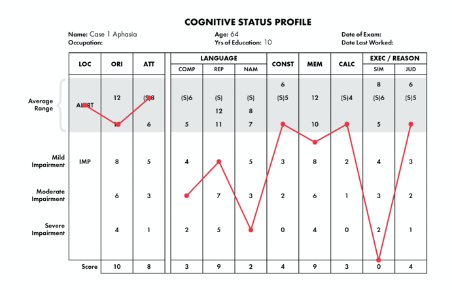Orientation:
A score of 10 out of 12 falls within the low end of the average range and raises the question of either mild confusion or mild memory impairment. This patient should be followed with serial evaluations.
Attention:
A score of 8 out of 8 falls within the average range.
Language:
The Comprehension subtest score indicates an inability to perform two-step commands and the naming subtest score indicates a severe weakness in confrontation naming. In the absence of hearing impairment or significant problems with attention, this indicates substantial acquired language impairment that should be further evaluated.
Constructions:
A score of 4 out of 6 falls at the low end of the average range. Spatial construction ability varies widely in the normal population, but this patient has mild difficulty with both the Memory and Construction subtests. This combination is worrisome as a possible early indication of Mild Cognitive Impairment (MCI). It is important to rule out treatable causes of MCI, to obtain a more comprehensive cognitive evaluation and to follow this patient closely in the future.
Memory:
A score of 9 out of 12 indicates mild memory impairment. It is important to carry out additional diagnostic procedures in order to rule out treatable causes of memory problems, to obtain a more comprehensive evaluation and to follow this patient closely in the future.
Summary:
This patient has specific areas of impairment: Comprehension, Repetition, Naming, Memory, Similarities.
